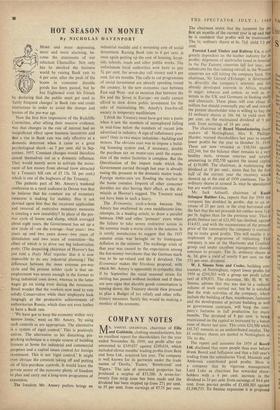HOT SEASON IN MONEY
By NICHOLAS
DAVENPORT
MORE and more depressing,
more and more alarming, be- Now the first firm impression of the Radcliffe Committee, after sifting their massive evidence, was that changes in the rate of interest had an insignificant effect upon business incentives and that a rise in Bank rate was only effective as a domestic deterrent when it came as a great psychological shock—as 7 per cent. did in Sep- tember, 1957. Constant changes .would therefore cancel themselves out as a domestic influence. They would merely serve to activate the move- ment of hot money from abroad (now attracted by a Treasury bill rate of £5 13s. 7d. per cent.) which is one of the bugbears of the Treasury.
. The pathetic part of Mr. Amory's weekend confession to a rural audience in Devon was that he believes that his constant use of monetary measures is making for stability. Has it not dawned upon him that the recurrent application and removal of restrictive monetary measures is creating a new instability? In place of the pre- war cycle of boom and slump, which averaged about eight years, the Government has set up a new cycle of—on the average—four years: two years up and two years down—two years of stimulation and two years of restriction—the effect of which is to drive our big industrialists Potty. (The despairing chairman of Hoover's has just told a Daily Mail reporter that it is now impossible to do any industrial planning.) The difference between the more extreme pre-war cycle and the present milder cycle is that un- employment was severe enough in the former to bring industrial costs down, whereas in the latter wages go on rising even during the recessions. Small wonder that the workers now tend to vote solidly Conservative while their employers look longingly at the productive achievements of authoritarian Russia, which does not even bother to have a Bank rate.
`We have got to keep the economy within very narrow limits,' went on Mr. Amory, `by using such controls as are appropriate. The alternative is a system of rigid control.' This is positively untrue. The alternative to his disturbing pin- pricking technique is a simple system of building licences at home for industrial and commercial purposes and a capital issues control for foreign investment. This is not 'rigid control.' It might even obviate the constant taking off and putting on of hire-purchase controls. It would leave the private sector of the economy plenty of freedom to plan and carry out a long-term programme of expansion.
The freedom Mr. Amory prefers brings an industrial muddle and a mounting cost of social investment. Raising Bank rate to 6 per cent. is once again putting ujii the cost of housing, hospi- tals, schools, roads and other public works. The unfortunate local authorities now have to pay 5k per cent. for seven-day call money and 6 per cent. for six months. The calls to cut programmes of social investment are already speeding round the country. In the new economic race between East and West—not to mention that between the Six and the Seven in Europe—we really cannot afford to slow down public investment for the sake of maintaining Mr. AmoN's free-for-all society in temporary equilibrium.
I think the Treasury must have got into a panic when it saw the numbers of unemployed falling in mid-June below the numbers of vacant jobs advertised in industry. A sign of inflationary pres- sure? Only in two major industries—building. and motors. The obvious cure was to impose a build- ing licensing system and, if necessary, double the purchase tax on motor-cars until the expan- sion of the motor factories is complete. But the liberalisation of the import trade which , the Government carried through last year is already easing the pressure in the domestic motor trade. Foreign motor-cars are flooding the market in the home counties. Imports of other consumer durables are also having their effect, as the dis- missals at Hoover's suggest. The Treasury need not have been in such a hurry.
The .Economist, cock-a-hoop because Mr. Amory has swallowed its own meddlesome line, attempts, in a leading article, to draw a parallel between 1960 and other 'pressure' years when the failure to take severe restrictive action in the summer made a worse crisis in the autumn. It is surely mendacious to suggest that the 1957 autumn crisis was brought on by inadequate deflation in the summer. The exchange crisis of that year was caused by the expectation among the hot-money merchants that the German mark was to be up-valued and the £ devalued. The Economist makes the frivolous proposal, with which Mr. Amory is apparently in sympathy, that if by September the usual seasonal strain for sterling has passed without incident and if there are sure signs that durable goods consumption is turning down, the Treasury should then proceed to plan a Budget of tax reliefs and other refla- tionary measures. Surely this would be making a monkey of the economy.


























































 Previous page
Previous page